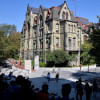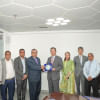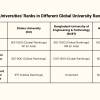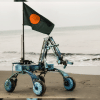KUET students turning plastic waste into furniture

A group of innovative minds from Khulna University of Engineering & Technology (KUET) are looking to make an impact on society through their project "PENTABLE" by tackling the pressing issue of plastic waste. An idea that arose during a late-night conversation with friends later went on to secure a top eight finish at the regional finals of the HULT Prize 2024.
PENTABLE came into existence through the initiative of four KUET students, all from the university's Mechanical Engineering department. The team includes Adib Muttaki as the team leader, Mohit Chowdhury who is involved with ideation and research, Faijus Salehin Nafi who oversees loophole analysis and operations, and Mohaimen Zaman who takes care of the financial side of things.
In regards to coming up with the idea, Adib says, "Excessive plastic waste is a major problem in Bangladesh. Around eight lakh tonnes of plastic waste is thrown into the sea annually in Bangladesh, and most of this waste is generated from discarded pens, bottles, and so on. The initial idea, as the name of our project suggests, was to turn pens into tables. Hence, the name PENTABLE came into existence. However, we gradually moved towards making other furniture pieces as well from discarded pens and other plastic waste."
The whole process of turning plastic into furniture consists of four steps – collection, preparation, extrusion, and assembly.
"Firstly, plastics, especially polypropylene plastics, are gathered from different plastic recycling sites and turned into polypropylene copolymers via sorting, cutting, and mixing. Reinforcing agents – primarily sawdust – are then mixed with the copolymers while they are in the semi-liquid stage. This makes the product two to three times harder than conventional plastic materials. A simple extrusion process follows this to make sheets and blocks for the furniture. After that, we finally start assembling the furniture," explains Adib.
After extensive study, experimentation, trials, and spending countless hours in the administration building to manage funding, PENTABLE took this idea to the Hult Prize 2024 Global Summits Bangkok as "Team Aperture".
Describing their journey at the competition, Adib says, "Our first round went incredibly well, but we didn't think that we would be one of the teams in the finals. Beyond all odds, however, we were called on the stage along with the other top eight teams. We felt really happy that we could give ourselves, our university, and Bangladesh that global exposure."
The competition might be over, but the team did not give up on its project. While the idea is still more of a concept, they are willing to do whatever it takes to make their dream a reality. As Adib puts it, "The project is still in its early stages right now. The long-term vision is to create a prototype that can compete with the existing furniture in the market and also be more eco-friendly, fashionable, and affordable. Additionally, PENTABLE is not just some other eco-friendly furniture brand. Our unique donation scheme also allows customers to donate old used furniture which we collect, refurbish, and distribute to underprivileged kids."
While they dream big, they are also aware of the challenges that lie ahead.
"One challenge we are currently facing involves getting the perfect polypropylene copolymers, as most of the plastic units available are either PVC or Styrofoam. The manpower needed to maintain a regular and uninterrupted supply chain is another concern for when we expand," Adib adds.
Nevertheless, the team is hopeful about their project. They believe there is a big need for a furniture company that is eco-friendly and socially impactful. In this regard, PENTABLE can provide the solution and become a brand that can compete with other traditional furniture manufacturers by grabbing people's attention in the near future.
Through innovation and hard work, this group of young students from KUET is showing us the potential that our country's youth has and how they can work towards the greater good.
Tamjidul Hoque is an UK LLB graduate.

 For all latest news, follow The Daily Star's Google News channel.
For all latest news, follow The Daily Star's Google News channel. 








Comments